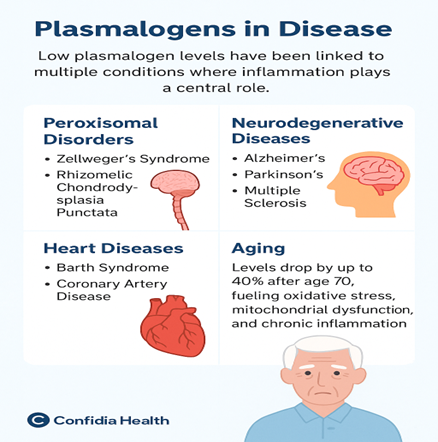Plasmalogens + Chronic Inflammation: The Connection
Plasmalogens, Chronic Inflammation, and the Future of Brain & Body Health
Inflammation is one of the body’s most important defense mechanisms. When you’re injured or fighting an infection, inflammation activates the immune system to protect and repair tissues. Normally, this process is temporary: once the threat is gone, inflammation resolves, and the body returns to balance.
But when inflammation fails to switch off, it becomes chronic inflammation — a condition linked to aging, neurodegeneration, and many chronic diseases. One fascinating discovery is that people with chronic inflammation often have low levels of plasmalogens, a special type of lipid that plays a crucial role in keeping cells healthy.
Inflammation and Plasmalogens
Inflammation works through a carefully coordinated system involving:
- Inducers – Triggers like infection or injury
- Sensors – Receptors (such as Toll-like receptors in immune cells) that detect danger
- Mediators – Signals like cytokines, chemokines, and lipid molecules
- Effectors – Cells and tissues that respond to fight infection or repair damage
In a normal acute inflammatory response, the body fights the threat and then resolves inflammation. But if this process doesn’t resolve, chronic inflammation develops—damaging tissues and driving disease.

Research shows that plasmalogens help regulate this balance. They act as reservoirs for key fatty acids (like DHA and arachidonic acid), which are used to create both pro-inflammatory and anti-inflammatory molecules. In other words, plasmalogens help the body turn inflammation on and off appropriately.
When plasmalogens are low, this balance breaks down, leading to excessive inflammation, oxidative stress, and tissue damage.
Restoring Plasmalogen Levels: A Therapeutic Strategy
Because plasmalogen loss is linked to so many diseases, scientists have begun exploring Plasmalogen Replacement Therapy (PRT).
What Studies Show
- Cell studies: Restored plasmalogen levels, improved mitochondrial function, reduced inflammation
- Animal studies: Improved cognition, reduced neuroinflammation, strengthened heart function
- Human studies: Early trials show benefits in Alzheimer’s, Parkinson’s, and metabolic disorders
Unlike many therapies, PRT can be delivered safely using oral plasmalogen precursors, making it practical and well-tolerated.
Key Takeaway
Chronic inflammation and plasmalogen loss appear to be deeply connected. As mitochondria become stressed and oxidative damage increases, plasmalogen levels drop—further fueling disease.
By restoring plasmalogens through Plasmalogen Replacement Therapy, researchers aim to reduce chronic inflammation, protect the brain and heart, and support healthy aging. This is a new frontier in molecular medicine—targeting the very lipids that form the foundation of life.
Confidia’s Precision Approach
At Confidia Health Institute, led by Dr. Kevin Greene, we go beyond symptom management. We target health at the cellular level—where resilience truly begins.
By integrating Plasmalogen Replacement Therapy tools like ProdromeNeuro™ and ProdromeGlia™, we help patients:
- Protect brain function and memory
- Calm chronic inflammation
- Strengthen heart and immune health
- Build long-term resilience against aging
👉 Ready to protect your brain, body, and future health at the cellular level?
Contact Confidia Health Institute
today to schedule a consultation with
Dr. Kevin Greene and learn how restoring plasmalogen levels can help safeguard your cognition, energy, and longevity.
